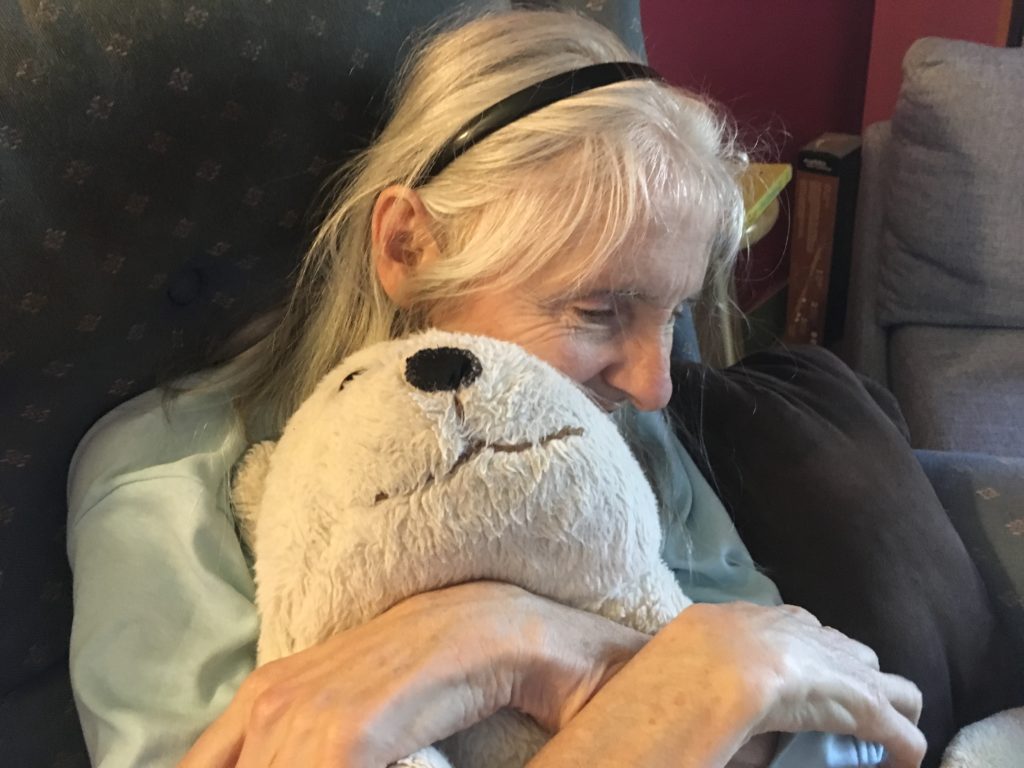“Are you hungry?” I asked before leaving our “bedroom” to make breakfast.
“Yes,” she replied in her barely audible manner these days.
Cindy responds to a question occasionally, though not very often. In fact, she infrequently makes any verbal sounds that would be attempts at communicating. I attempted to put Kirk Jr. in her arms before leaving, but she appeared to be resisting. I asked:
“Do you want Kirk Jr.”
“No,” she responded breathlessly.

Now this was uncharted territory. Two responses minutes apart, rather than a week apart, was cause for notice. After breakfast we did her exercise routine, then I balanced Cindy on her feet to “dance.” She clutches her arms to her chest as always in her initial stance. I need to pry them loose and wrap them behind my back for the sake of our “dance.”
“Let’s get this arm around me where it belongs,” I say, as I often do:
“Uh-huh,” she responds for the third time in the same morning. Cindy also giggled and smiled frequently during the morning, almost like the “old” days (a few years ago) when I could get Cindy to smile simply by smiling at her first. Now this was something worth writing a blog post about.
Now for the bad news. Cindy’s lucidity came the second morning after she had another seizure, even though I gave her anti-seizure medicine right before the 2:30 am episode. No subsequent seizure has been as bad as the first, but this one was up there. She bit her tongue, causing blood to trickle out of her mouth, the second time in a row that has happened from her seizures.
I do not think Cindy is near death, but there is a phenomena called paradoxical lucidity that occurs to some people who do. The week or so before they pass away their cognition becomes much clearer. Could there be some relationship between a seizure assaulting the mind and the clarity that sometimes occurs before death?
Cindy has experienced about ten seizures since the first one last March. After each one Cindy was most likely to respond to a question; most likely to show recognition of people; most likely to smile brightly. This observation comes with no definitive insight, but there must be more than coincidence to this.
A partial explanation could be the supplements I give Cindy to mitigate general twitching and occasional seizures. At least I can claim that no seizure has been as bad as the first one nine months ago. I do not claim that these, nor any supplements automatically enhances brain health, for reasons I will cover in a subsequent post. However, the mechanism of action for the supplements I use are certain and the results may be more than coincidence. Considering that none of them have harmful side effects, others might give them consideration.
I give melatonin as a noted brain hormone. People usually take melatonin to help with sleep, but it has known anti-seizure properties and facilitates removal of brain toxins as well. I give ashwagandha, an herb also with anti-seizure properties and proven to lower blood pressure. Admittedly, I am the one in need of lowered blood pressure, but lower blood pressure also means better flow to the brain.
I give Cindy a choline supplement, more for brain enhancement than an anti-seizure measure. Most Alzheimer’s medicines to date are anticholinase inhibitors. That is a fancy way of saying they allow choline to be processed by the brain more effectively. I do not propose with any certainty that a choline supplement will reverse or slow down dementia, but as an essential nutrient for the brain I figured it does not hurt.
Other supplements I give Cindy are Vitamins C and D, though these are more for general health. Three years ago Cindy could no longer walk; nine months ago she became fully incapacitated an placed on hospice care. Yet here she is, still enjoying life to the extent that she can. I share may approach with supplements not as a proposed cure but as possibly enhancing the quality of life during this tragic affliction.

Several messages here, Kirk. #1 is the power of love.
Kudos to you.
And to Cindy, “you go girl”!
You both are doing it, Kirk!